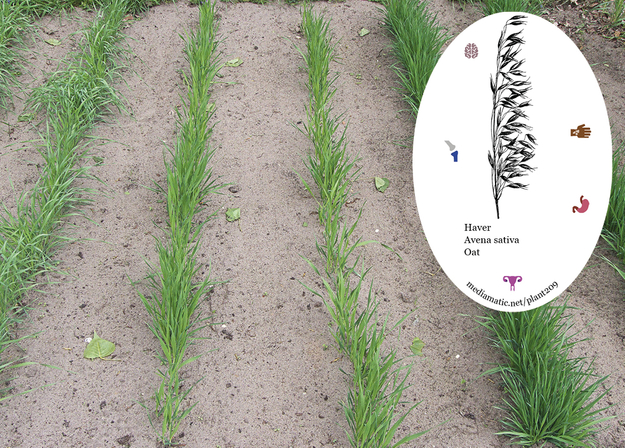Whilst used mainly as a food, oat grain does also have medicinal properties. In particular oats are a nutritious food that gently restores vigour after debilitating illnesses, helps lower cholesterol levels in the blood and also increases stamina. The seed is a mealy nutritive herb that is antispasmodic, cardiac, diuretic, emollient, nervine and stimulant. The seed contains the antitumor compound b-sitosterol and has been used as a folk remedy for tumours. A gruel made from the ground seed is used as a mild nutritious aliment in inflammatory cases, fevers and after parturition. It should be avoided in cases of dyspepsia accompanied with acidity of the stomach. A tincture of the ground seed in alcohol is useful as a nervine and uterine tonic. A decoction strained into a bath will help to soothe itchiness and eczema. A poultice made from the ground seeds is used in the treatment of eczema and dry skin. When consumed regularly, oat germ reduces blood cholesterol levels. Oat straw and the grain are prescribed to treat general debility and a wide range of nervous conditions[254. They are mildly antidepressant, gently raising energy levels and supporting an over-stressed nervous system. They are of particular value in helping a person to cope with the exhaustion that results from multiple sclerosis, chronic neurological pain and insomnia. Oats are thought to stimulate sufficient nervous energy to help relieve insomnia. An alcoholic extraction of oats has been reported to be a deterrent for smoking, though reports that oat extract helped correct the tobacco habit have been disproven. A tincture of the plant has been used as a nerve stimulant and to treat opium addiction. In an article riddled with errors, the Globe (February 28, 1984) reports that oat straw, usually taken as a tea, is a sexual nerve tonic. The German Commission E Monographs, a therapeutic guide to herbal medicine, approve Avena sativa for inflammation of the skin, warts (see for critics of commission E). Source: https://pfaf.org/v
Oat
Avena sativa
Find more about this plant on Wikipedia.
